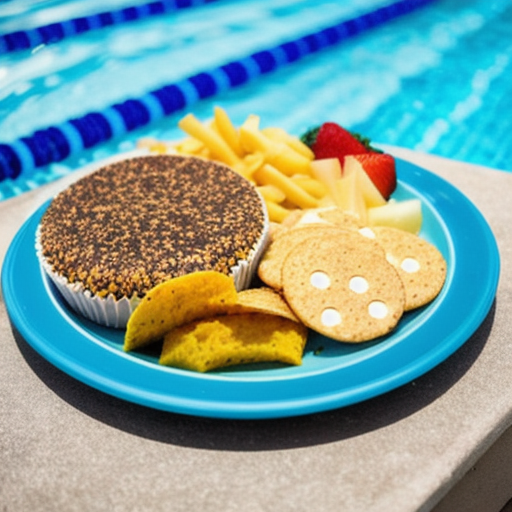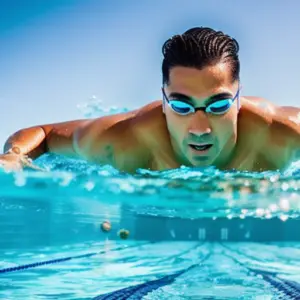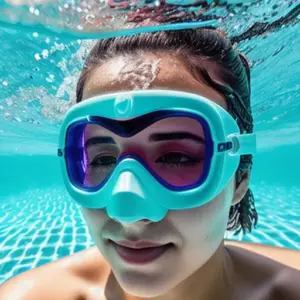Picture this: you’ve just wrapped up an invigorating swim, feeling the cool water on your skin, and the sun warming you up as you step out of the pool. As you wrap yourself in a towel, you suddenly realize something – you’re absolutely famished! Even though you had a meal just a couple of hours ago, swimming has left you with an immense hunger as vast as the ocean you’ve been swimming in. If this scenario sounds familiar to you, then you probably know that there’s no appetite like a post-swim appetite. But have you ever wondered why swimming makes you so ravenous? Dive in with us as we explore the science behind that relentless hunger and how you can still stay on the healthy side despite consuming a scrumptious meal after a swim.
Swimming causes more hunger than other exercises
Swimming is a popular form of exercise that offers numerous health benefits, ranging from muscle toning to cardiovascular improvement. However, one common question that arises among swimmers is why swimming seems to cause more hunger than other exercises. Research has shown that this increased appetite isn’t due to swimming burning more calories, as activities like running and cycling burn a similar amount of calories at the same intensity. The answer lies in the temperature of the water.
A study conducted by the University of Florida revealed that participants who exercised in cold water consumed 44% more calories afterward compared to those who exercised in warm water. This is because the cold temperature triggers blood vessels to constrict, which in turn may prevent the release of hormones that suppress hunger. It is believed that this response to cold temperatures is similar to how animals eat more in preparation for winter hibernation.
Moreover, it’s not just casual swimmers who experience increased hunger after swimming, even professional athletes report feeling ravenous after swim workouts. Overall, the cooling effect of the water appears to be the main reason for this heightened sense of hunger in swimmers. To avoid overindulging after a swim session, it’s important for individuals to plan their post-swim nutrition carefully and include foods high in protein and healthy fats for increased fullness.
Cold water temperature affects appetite
One of the most compelling theories that explain why swimming makes you hungrier than other forms of exercise is related to the temperature of the water. When comparing aquatic and land-based workouts, it becomes apparent that the temperature of the pool plays a significant role in affecting appetite. In general, swimming pools tend to be about 16-20˚F (8.9-11.1˚C) cooler than room temperature.
Scientific research supports the notion that cold water boosts hunger. A study conducted by the University of Florida found that participants who exercised in cold water (68˚F/20˚C) consumed 44% more calories compared to those who exercised in warmer water (91.4˚F/33˚C), despite both groups burning almost the same amount of calories. Experts believe that this appetite-inducing effect could be due to the body’s need for energy to maintain its core temperature in cold environments.
When exercising, the body generates heat through cellular respiration in the muscles. In response, blood is diverted from the stomach towards the skin to dissipate excess heat, resulting in diminished digestion and appetite suppression. However, when swimming in cold water, the skin remains cool, and the body may take less blood away from the stomach. This increased digestive activity could, in turn, lead to increased hunger following a swim.
The temperature of the pool water appears to be a significant factor contributing to the increased appetite experienced by swimmers. Therefore, it’s essential to account for this phenomenon when planning one’s nutrition and workout routine.

Pool water temperature makes you hungrier
Did you know that swimming in a cold pool might be responsible for your increased appetite after a swim workout? Several scientific findings suggest that the temperature of the pool water is one of the main reasons why swimming makes you hungrier than other forms of exercise. In fact, cold or even normal temperature pool water can ramp up your feelings of hunger, urging you to eat more.
A study conducted by the University of Florida found that individuals who exercised in cold water (68˚F/20˚C) consumed 44% more calories than those who exercised in warmer water (91.4˚F/33˚C). This happened despite both groups burning nearly the same number of calories during their workouts. The reason behind this phenomenon lies in our body’s response to heat generation during exercise. When we work out, our body generates heat as part of the energy production process. To regulate this heat, blood is diverted away from the stomach and toward the skin to release excess warmth.
However, when swimming in cold water, our skin remains cooler due to the surrounding water temperature. This means less blood is diverted away from the stomach, allowing digestion to continue at a higher level than during other types of exercise. Consequently, your body signals increased hunger to compensate for the higher levels of digestion.
So, the next time you feel hungrier after a swim workout, remember that the pool water temperature might be the primary culprit!
High intensity swimming can create afterburn effect
High-intensity swimming workouts have been known to make swimmers feel hungry afterward, and one possible explanation for this phenomenon is the afterburn effect. The afterburn effect, also known as Excess Post-Exercise Oxygen Consumption (EPOC), is a process in which the body continues to burn calories at an increased rate, even after the completion of the workout. This occurs because the body needs to replenish the energy sources depleted during the intense exercise, repair damaged muscle tissues, and return the body to its resting state.
When engaging in a high-intensity swimming workout, swimmers utilize multiple muscle groups and expend a significant amount of energy during their training session. As a result, their body requires more fuel to recover, leading to an increased appetite and feelings of hunger post-workout. The afterburn effect of high-intensity workouts can last for hours, depending on the intensity and duration of the swimming session.
Furthermore, along with the afterburn effect, the temperature of the pool water also plays a role in causing hunger in swimmers, as discussed earlier in the article. Combining these two factors can lead to a heightened sense of hunger in swimmers after their workout, prompting them to refuel and replenish the energy they expended during their intense session. It is crucial for swimmers to carefully plan their post-workout nutrition and incorporate a balanced meal that includes proteins, healthy fats, and carbohydrates to support optimal recovery and satiate their hunger properly.
Low intensity swimming can lead to hunger
Low-intensity swimming, characterized by gentle, relaxed movements, is known for its numerous health benefits such as improving cardiovascular health, increasing flexibility, and relieving stress. However, it can also lead to an increased feeling of hunger. This may come as a surprise to some, but there is a scientific explanation to this seemingly counterintuitive phenomenon.
Hunger is the body’s signal that it needs fuel to function properly. When blood glucose levels drop, the body triggers a hunger response, encouraging one to replenish their energy stores. Studies have shown that exercise can either increase or decrease hunger, depending on the intensity of the workout. Low-intensity exercises such as slow swimming can trigger a hunger response in the body, leading to an increased desire to eat, even though the calorie expenditure might not be that high.
One reason for this phenomenon is that low-intensity swimming does not produce the same level of appetite-suppressing hormones as high-intensity workouts. Higher intensity workouts release hormones that signal to the brain that the body is full, therefore suppressing hunger. Conversely, low-intensity workouts do not produce the same response, leading to increased feelings of hunger.
Additionally, as mentioned earlier, the temperature of the water can play a role in increasing feelings of hunger. Exposure to colder temperatures causes the body to expend energy to maintain its core temperature, triggering a hunger response to replenish the burnt calories. In conclusion, if you find yourself feeling hungry after a low-intensity swimming session, it’s important to plan your nutrition accordingly and opt for a balanced meal consisting of proteins, healthy fats, and carbohydrates to satiate your hunger.
Swimming can cause dehydration which leads to hunger
Swimming is an excellent form of exercise that provides numerous health benefits; however, one noteworthy side effect that swimmers often experience is an increased appetite. Dehydration is a significant factor contributing to this sensation of hunger. When swimming, the body loses fluids through sweat and evaporation. As a result, the body’s hydration levels can become imbalanced, leading to increased feelings of hunger.
In addition to the physical exertion involved in swimming, the aquatic environment also plays a significant role in causing dehydration. As swimmers spend extended periods submerged in water, their bodies are continuously exposed to water, which can lead to increased evaporation and dehydration. Consequently, swimmers must be mindful of their hydration levels and ensure they rehydrate adequately both during and after their workouts.
Dehydration can also impact the body’s natural hunger signals. When dehydrated, the body might confuse these signals with the need for food, causing individuals to feel hungry even when they do not require additional calories. In turn, this can lead to overeating or consuming unhealthy food choices as swimmers try to satiate their hunger and replenish their energy levels.
To avoid the pitfalls of dehydration-induced hunger, swimmers should make a conscious effort to stay hydrated by drinking water or sports drinks before, during, and after their workouts. Furthermore, maintaining a well-balanced diet and consuming nutrient-dense meals and snacks can help keep hunger at bay and support optimal swimming performance.
Body fat levels affect hunger in swimmers
A fascinating aspect that can influence hunger in swimmers is their body fat percentage. Research indicates that individuals with a lower body fat percentage tend to feel hungrier after engaging in physical activities, including swimming. This heightened hunger sensation can be attributed to the fact that athletes with less body fat have fewer energy reserves to draw from during a workout. Consequently, their bodies demand more calories to refuel and recover, leading to increased hunger levels.
In swimming, body fat plays a crucial role in providing buoyancy and insulation against cold water temperatures. As a result, swimmers who possess a higher body fat percentage may experience a reduced sensation of hunger after workouts since their energy reserves are comparatively more significant. However, it is essential to note that an excessively high body fat percentage can affect a swimmer’s performance negatively.
In conclusion, body fat levels can indeed have an impact on the hunger experienced by swimmers. Athletes with lower body fat percentages tend to feel hungrier as their bodies require more energy for recovery and fuel during workouts. On the other hand, swimmers with higher body fat percentages might experience reduced feelings of hunger due to their larger energy reserves. Nonetheless, maintaining an optimal body fat percentage is vital for swimmers to achieve peak performance and overall health.
Aquatic aerobics can aid weight loss
Aquatic aerobics is an excellent form of exercise for individuals aiming to achieve weight loss and improve overall health. This low-impact workout combines the buoyancy and resistance properties of water with fun and energizing movements, making it suitable for people of all ages and fitness levels. Engaging in aquatic aerobics offers numerous advantages for shedding those extra pounds while keeping your body in optimal condition.
Water-based exercises, such as swimming and aquatic aerobics, help burn calories effectively, with a 155-pound person capable of burning approximately 800 calories per session. The resistance provided by the water enables a comprehensive and efficient workout targeting various muscle groups, leading to increased strength, endurance, and flexibility. Furthermore, amidst the refreshing waters, the exercise feels less strenuous, encouraging participants to exert greater effort and energy.
Another significant advantage of aquatic aerobics for weight loss is its gentle impact on the joints. Those who are overweight, sedentary, or recovering from an injury can greatly benefit from this form of exercise, as it reduces the stress on their joints while still providing an effective workout. Moreover, the soothing and therapeutic effect of water may also aid in faster recovery and pain management.
In conclusion, aquatic aerobics is a great choice for individuals seeking a fun and efficient way to lose weight and enhance overall well-being. With the help of certified instructors and tailored programs, participants can reap the benefits of this enjoyable and rewarding water-based workout.
Exercise in warm water can reduce hunger
Exercise in warm water has been found to reduce hunger, as compared to exercising in cold water. This interesting phenomenon has a scientific explanation that benefits swimmers in the long run. A study conducted by the University of Florida found that people tend to consume more calories after exercising in cold water than in warm water. In fact, the participants who exercised in cold water consumed 44 percent more calories than those who exercised in warm water.
The reason behind this increase in appetite after cold water exercise lies in the constriction of blood vessels. When we exercise in cold water, our blood vessels constrict due to the lowered temperature. This constriction may prevent the release of certain hormones that typically make us feel less hungry. The result is an increased appetite after a cold water swim. On the other hand, exercising in warm water seems to maintain the regular hormonal balance, thereby curbing post-workout hunger.
This insight is particularly useful for swimmers and those who prefer water-based exercises. By choosing to exercise in warmer water, they can potentially experience a reduced appetite, helping them manage their calorie intake more effectively. Thus, the next time you plan a swim or a water workout, consider opting for a warmer pool to potentially keep your hunger in check.
Healthy food choices can help manage post-swim hunger.
Swimming is an excellent form of exercise that can help build and tone muscles while improving cardiovascular health. However, many swimmers find themselves feeling hungry after a swim session. This is primarily due to the cold temperature of the water, coupled with the energy expended during the workout. It is essential to manage post-swim hunger with healthy food choices to ensure that your body is replenished with the nutrients it needs and to avoid overeating.
After swimming, opt for a meal that includes a balance of proteins and healthy fats to promote satiety. Meals such as a bagel with smoked salmon and avocado, yogurt with nuts and seeds, or an egg salad sandwich on whole-grain bread provide a delicious and nutritious way to refuel your body. If you don’t have time for a full meal after swimming, pack a healthy snack like a protein bar, a humble handful of trail mix, or a peanut butter and jelly sandwich on whole-grain bread. These snacks can help curb your appetite until your next meal.
To further manage post-swim hunger, consider eating a light, carbohydrate-rich meal before your workout. Foods like fresh fruit, oatmeal with banana, a sandwich with lean meat, or a granola bar will provide your body with the energy it needs to power through your swimming session. By paying attention to your nutrition, you can effectively manage post-swim hunger and ensure that your body receives the nutrients it needs for optimal health and performance.




